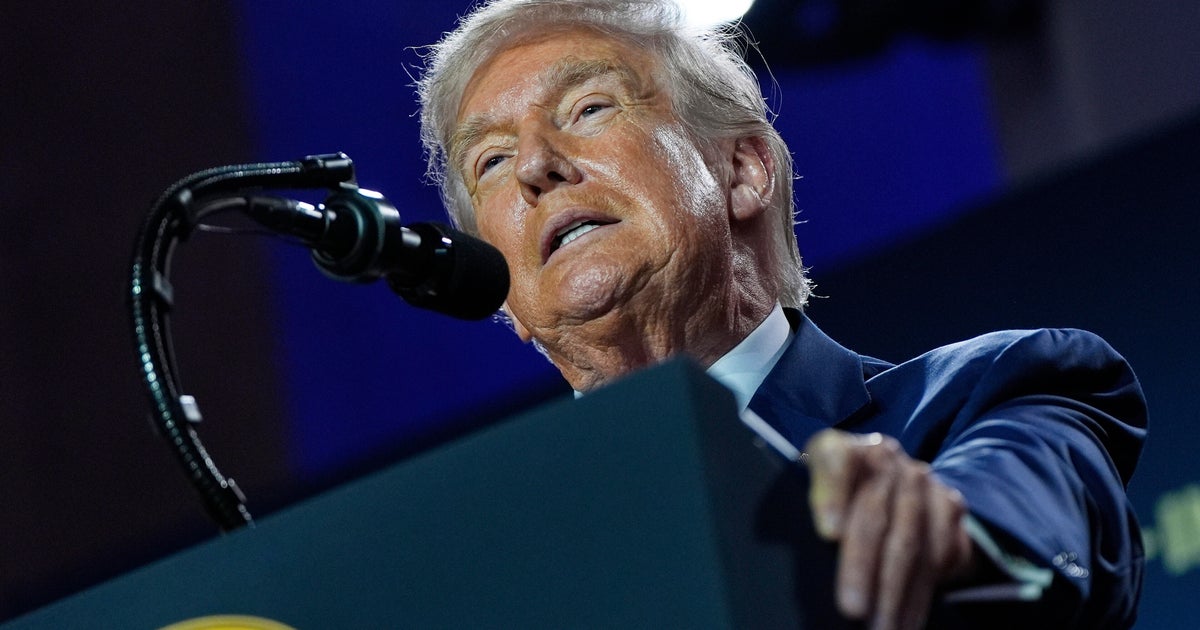

No response returned

The Trump administration on Wednesday an AI Action Plan aimed at maintaining U.S. dominance in the rapidly emerging artificial intelligence field. The initiative is part of an ongoing effort the White House began earlier this year with an executive removing AI guardrails imposed by the Biden administration.
Mr. Trump spoke about the new plan during a keynote address at an AI summit in Washington, D.C., on Wednesday, after which he signed executive orders to help fast-track AI development.
"Around the globe, everyone is talking about artificial intelligence," Mr. Trump said Wednesday. "I find that too, 'artificial' — I can't stand it. I don't even like the name. I don't like anything that's artificial, so could we straighten that out, please? We should change the name. I actually mean that. I don't like the name artificial anything. Because it's not artificial, it's genius. It's pure genius."
Mr. Trump said AI has the potential to "transform every type of endeavor and domain of human knowledge, from medicine to manufacturing to warfare and national defense."
"Whether we like it or not, we're suddenly engaged in a fast-paced competition to build and define this groundbreaking technology that will determine so much about the future of civilization itself," he said.
The Trump administration's plan, which includes more than 90 federal policy actions, broadly will:
Mr. Trump said "a lot of very brilliant people" tell him AI will dominate virtually every industry, although he said he doesn't know if that's true. The president said AI brings the possibility of peril, as well as progress.
"The daunting power of AI is really, it's not going to be a reason for retreat from this new frontier," Mr. Trump said. "On the contrary, it is the more reason we must ensure it is pioneered first and best."
AI is like a "beautiful baby that's born," he said of the technology's current state.
"We have to grow that baby and let that baby thrive," the president said. That means allowing some regulation, but also cutting red tape, he said.
The president thanked companies present at the summit for investing in data centers and other projects, saying they'll create thousands of jobs.
The Wednesday announcement is co-hosted by the bipartisan Hill and Valley Forum and the All-In Podcast, a business and technology show hosted by four technology investors and entrepreneurs who include Mr. Trump's AI and crypto czar David Sacks.
"The goal here is for the United States to win the AI race," Sacks said during a press call with reporters Wednesday morning.
The plan is backed by the Office of Science and Technology Policy (OSTP) and will be carried out over the next six months to a year, according to Michael Kratsios, policy director of the OSTP.
"This is a watershed day for Trump to lay out the AI vision and make sure the U.S. stays ahead of China despite all the trade deal turmoil," Wedbush Securities analyst Dan Ives said in an email to CBS MoneyWatch.
The AI Action Plan focuses on accelerating AI innovation and building out AI infrastructure to ensure the U.S. leads in international "AI diplomacy," according to Sacks, who laid out the plan's major pillars during Wednesday's call.
That includes expediting the construction of , which house servers, networking gear and other technology used to power artificial intelligence.
Thousands of data centers are scattered around the U.S. Most are connected to the nation's power grid and rely on massive amounts of electricity to operate. The proliferation of AI data centers has been cited as one of the drivers of .
The number of data centers is only expected to grow as technology companies — including Amazon, Meta, Microsoft, OpenAI and xAI — ramp up construction to meet the nation's growing energy demand stemming from the emergence of AI.
In addition to investments in data centers, the new White House plan also focuses on "expediting and modernizing programs" for semiconductor fabrication plants, or fabs, and updating the nation's electric grid to support the enormous energy demands of AI supercomputing, Kratsios said.
Another focus will be on reining in what White House officials have called an "ideological bias" in chatbots. This is something Sacks, a former PayPal executive, has highlighted after a 2024 incident in which Google's AI image generator created pictures of Black, Asian and Native American men when asked to show one of the countries Founding Fathers.
"We believe that AI systems should be free of ideological bias and not be designed to pursue socially engineered agendas," Sacks said on Wednesday. "And so we have a number of proposals there on how to make sure that AI remains truth-seeking and trustworthy."
To that end, Kratsios said the plan will update federal procurement guidelines to ensure the government only contracts with AI developers whose systems "allow free speech expression to flourish."
The plan also seeks to maintain the U.S.' edge in the global race for AI dominance as it competes with countries like China, which has moved quickly to expand its AI capabilities. A senior White House official said the report supports export controls to make sure "that our most advanced technology doesn't get into the hands of [other] countries."
As part of its efforts, the White House also seeks to remove what it refers to as that the Trump administration says is hindering AI innovation. The official added that the plan calls for the removal of diversity, equity and inclusion and climate funding requirements from the Biden administration's CHIPS Act.
DEI regulations within the Creating Helpful Incentives to Produce Semiconductors (CHIPS) for America Act "burden the industry" and "slow down the delivery of critical projects," they said.




